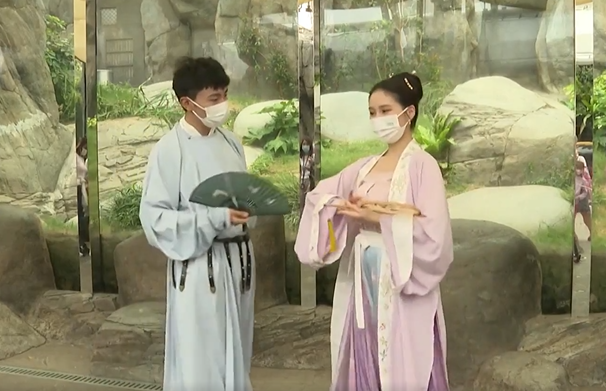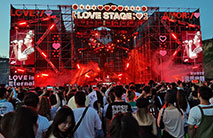Young people driving hanfu revival in daily life find self-identity in Hong Kong

Screenshot/Xinhua
HONG KONG, July 26 (Xinhua) -- It had been a "long" and agonizing walk from home to the subway station for teenage Mandy Chan when she first put on hanfu in public.
"It was a set with a cream-colored shirt, a brown jacket styled in China's Ming dynasty and a red pleated skirt made by myself," she recalled recently, almost 10 years later.
It was not the looks from others but her limited knowledge on the traditional Chinese clothing that had terrified her. "If anyone had asked what I was wearing, or the history behind it, I would have been afraid I couldn't tell them the whole picture," Chan, now 28, told Xinhua.
"I felt a little bit frightened and nervous," Chan said. "I figured I must wear hanfu and step outside if I do love it."
However, her uneasiness had gradually drifted away with more in-depth research on traditional Chinese culture, and her persistent passion for hanfu has brought her self-identity and a sense of belonging in Hong Kong, a place that combines different cultures together.
Hanfu, the traditional clothing of China's Han ethnic group that was formed in the main residential areas of the Han people in ancient China, has made a comeback nowadays as an increasing number of young Chinese are adopting hanfu as part of their everyday and public wardrobes.
For hanfu lovers like Chan, the piece of historical clothing has untold stories and philosophical ideas in its every detail.
The cutting and stitching line in the middle part of hanfu, Chan said, fits the spine of the human body and helps people to dress properly. This design, which has transcended itself as mere decoration, points to the qualities of the wearers as upright and moderate individuals.
"With much bigger cloth available nowadays, some of the cuttings and stitching during traditional clothes-making are no longer needed, but the line in the middle is still there," Chan said.
Chan's love for hanfu is also a path of exploring herself and a way to approach her dreams.
"Instead of imitating people as what I used to do, I have jumped out of my comfort zone and found the style that suits me best," Chan added. "Through hanfu, I have found myself and so many unexplored things in my life."
Chan said she had found her lifelong passion through hanfu, which is a goal and dream that has never been absent from her life. "Hanfu means a lot to me. It is second only to myself."
Chan appreciates the openness and inclusiveness of Hong Kong, an east-meet-west hub for international arts and cultural exchanges.
The picture of hanfu lovers like Chan wearing this outfit can be seen on Hong Kong's iconic modern skylines on some special occasions including traditional Chinese festivals or western holidays such as Christmas.
"Hanfu in combination with Hong Kong is an extraordinary fusion of fashion," Chan said.
The teenage Chan found she was not alone after falling in love with hanfu, which, though, seemed like a fringe subculture in Hong Kong back then. In later years, some internet-savvy young people, feeling a need to belong, have shared their interest in the traditional clothing by forming a group to facilitate communications and promote better public understanding of hanfu in Hong Kong.
The group, with over 200 members now, was expanded to a registered society called "Hanfu-Hong Kong" in 2013. More and more Generation Z resistant to homogenization in the modern world joined the group and took their first step by introducing the niche culture through a variety of activities.
Chan, as one of the founders of Hanfu-Hong Kong, recognized some emerging business opportunities. Four years ago, she established a hanfu studio which enables consumers to experience a slice of life in ancient China with hanfu and traditional make-up and hair-styling, and also rents out outfits and accessories.
Colorful costumes with different patterns, jewelry and ornaments crowd the compact studio in an industrial building in Hong Kong's Kwai Chung area.
"I guess I have over 200 suits of hanfu," Chan said, adding that these outfits present hanfu styles from almost every period of the Chinese history.
She believes that classics will never go out of style and she herself has incorporated hanfu into her everyday outlook. While working and shopping, she matches simple-design and quiet-color hanfu pieces with fashionable shoes to better suit a modern lifestyle.
"Everyone could wear hanfu regardless of their age, size or gender," Chan said. "Hanfu does not only exist in TV series or on the internet, but can be fully integrated into our daily life."
Photos
Related Stories
- Over 3 mln people get at least one COVID-19 vaccine shot in Hong Kong
- Hong Kong remains fascinating place to businesses: CEO of CLP Holdings
- Forum held in Hong Kong to promote cultural exchanges between East, West
- Carrie Lam sees Hong Kong, Bohai economic rim complementary in development
- Hong Kong Book Fair draws 830,000 visitors amid COVID-19
Copyright © 2021 People's Daily Online. All Rights Reserved.










